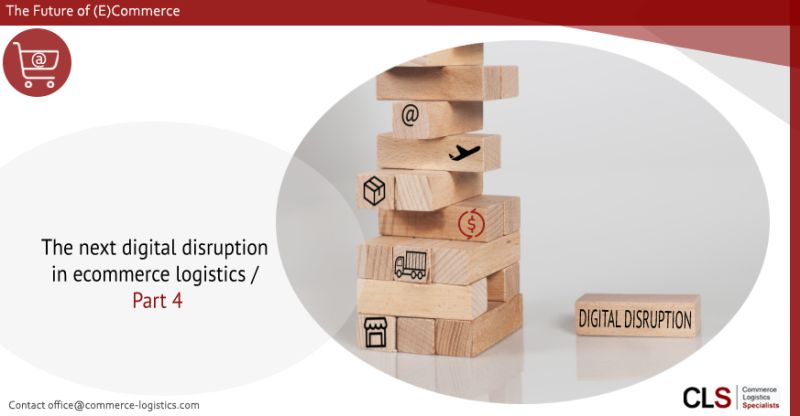CLS speaks out: The next digital disruption in ecommerce logistics / Part 4

Ecommerce volumes are growing, “true omnichannel” #retail is emerging, and stationary retail is getting a second chance. New #lastmile #businessmodels and #digital disruptions bring unprecedented #efficiency gains to last-mile #ecommerce #logistics.
𝗧𝗵𝗲 𝗲𝘃𝗼𝗹𝘂𝘁𝗶𝗼𝗻 𝗼𝗳 𝗿𝗲𝘁𝗮𝗶𝗹
Advance #data at individual item level redefines the very nature of delivery, with the biggest changes impacting the retail #businessmodel. Currently:
· #Manufacturers produce goods and offer #services;
· #Retailers consolidate, sell, and distribute goods to #consumers;
· Ecommerce allowing both manufacturers and retailers to sell #online and ship directly to consumers;
· #Marketplaces consolidate #onlineretailers, becoming the virtual equivalent of stationary #retailchains. They bind #suppliers to their #infrastructure, including logistics, occasionally developing and selling their own #brands in #competition with merchants on their platforms;
· Start-up food and grocery delivery companies have become local marketplaces, offering same-day delivery of goods.
𝗧𝗵𝗲 𝗳𝘂𝗻𝗱𝗮𝗺𝗲𝗻𝘁𝗮𝗹 𝗿𝗲𝘁𝗮𝗶𝗹 𝗯𝘂𝘀𝗶𝗻𝗲𝘀𝘀 𝗺𝗼𝗱𝗲𝗹 𝗵𝗮𝘀 𝗿𝗲𝗺𝗮𝗶𝗻𝗲𝗱 𝘂𝗻𝗰𝗵𝗮𝗻𝗴𝗲𝗱 𝘂𝗻𝘁𝗶𝗹 𝗻𝗼𝘄
In recent years a new #logisticsmodel has emerged, driven by digital competence, brick-and mortar infrastructure to store, prepare and transfer #shipments, and a highly standardized last-mile infrastructure of #vehicles and #drivers. Each component can be inhouse or outsourced and is interchangeable. Stationary and online retail merge.
𝗪𝗵𝗼 𝗽𝗿𝗼𝗳𝗶𝘁𝘀 𝗳𝗿𝗼𝗺 𝘁𝗵𝗶𝘀 𝗱𝗲𝘃𝗲𝗹𝗼𝗽𝗺𝗲𝗻𝘁?
· Over the short term, this favours marketplaces and large online retailers who have a high level of digital competence and already provide their own delivery services.
· Major brick-and-mortar retail chains could be also big winners – if they operate a dense branch network and can establish the required digital competence.
· Carriers could be among the losers. Over the short term they benefit from increasing volumes and potential last mile efficiency gains, but their customer base threatens to dwindle.
· Marketplaces and major retailers will build their own delivery networks, and local retailers will turn to local delivery solutions.
This is only the short-term scenario. Perhaps none of the stakeholders described above will be the overall winners of this #development: lately, the best performing #ecommercesector in Germany has overwhelmingly been manufacturers, #shipping their goods directly without brick-and-mortar or online retailers as #intermediaries.
The winners could be the manufacturers and logistics service providers (#LSP) who provide white-label intra-logistics for last-mile delivery infrastructure, while the #trend for marketplaces and #supermarkets to become manufacturers themselves will continue.
Click here for the LinkedIn-Article.

Walter Trezek
Document Exchange Network GmbH

